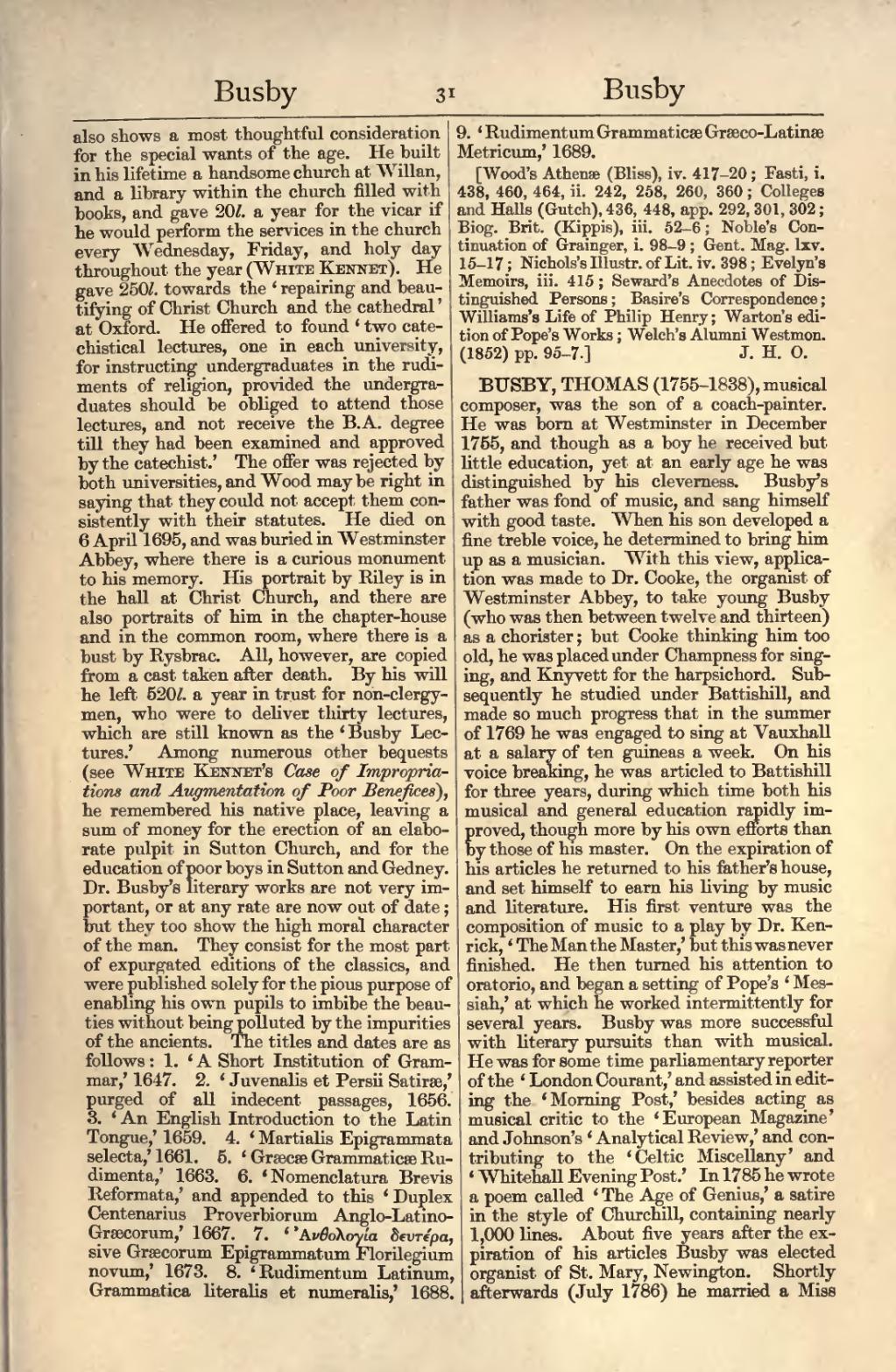also shows a most thoughtful consideration for the special wants of the age. He built in his lifetime a handsome church at Willan, and a library within the church filled with books, and gave 20l. a year for the vicar if he would perform the services in the church every Wednesday, Friday, and holy day throughout the year (White Kennet). He gave 250l. towards the 'repairing and beautifying of Christ Church and the cathedral' at Oxford. He offered to found 'two catechistical lectures, one in each university, for instructing undergraduates in the rudiments of religion, provided the undergraduates should be obliged to attend those lectures, and not receive the B.A. degree till they had been examined and approved by the catechist.' The offer was rejected by both universities, and Wood may be right in saying that they could not accept them consistently with their statutes. He died on 6 April 1695, and was buried in Westminster Abbey, where there is a curious monument to his memory. His portrait by Riley is in the hall at Christ Church, and there are also portraits of him in the chapter-house and in the common room, where there is a bust by Rysbrac. All, however, are copied from a cast taken after death. By his will he left 520l. a year in trust for non-clergymen, who were to deliver thirty lectures, which are still known as the 'Busby Lectures.' Among numerous other bequests (see White Kennet's Case of Impropriations and Augmentation of Poor Benefices), he remembered his native place, leaving a sum of money for the erection of an elaborate pulpit in Sutton Church, and for the education of poor boys in Sutton and Gedney. Dr. Busby's literary works are not very important, or at any rate are now out of date ; but they too show the high moral character of the man. They consist for the most part of expurgated editions of the classics, and were published solely for the pious purpose of enabling his own pupils to imbibe the beauties without being polluted by the impurities of the ancients. The titles and dates are as follows: 1. 'A Short Institution of Grammar,' 1647. 2. 'Juvenalis et Persii Satiræ,' purged of all indecent passages, 1656. 3. 'An English Introduction to the Latin Tongue,' 1659. 4. 'Martialis Epigrammata selecta,' 1661. 5. ' Græcæ Grammaticæ Rudimenta,' 1663. 6. 'Nomenclatura Brevis Reformata,' and appended to this 'Duplex Centenarius Proverbiorum Anglo-Latino-Græcorum,' 1667. 7. 'Ανσρολογία δευτέρα, sive Græcorum Epigrammatum Florilegium novum,' 1673. 8. 'Rudimentum Latinum, Grammatica literalis et numeralis,' 1688. 9. 'Rudimentum Grammaticæ Græco-Latinæ Metricum,' 1689.
[Wood's Athenæ (Bliss), iv. 417-20; Fasti, i. 438, 460, 464, ii. 242, 258, 260, 360; Colleges and Halls (Gutch), 436, 448, app. 292, 301, 302; Biog. Brit. (Kippis), iii. 52-6; Noble's Continuation of Grainger, i. 98-9; Gent. Mag. lxv. 15-17; Nichols's Illustr. of Lit. iv. 398; Evelyn's Memoirs, iii. 415; Seward's Anecdotes of Distinguished Persons; Basire's Correspondence; Williams's Life of Philip Henry; Warton's edition of Pope's Works; Welch's Alumni Westmon. (1852) pp. 95-7.]
BUSBY, THOMAS (1755–1838), musical composer, was the son of a coach-painter. He was born at Westminster in December 1755, and though as a boy he received but little education, yet at an early age he was distinguished by his cleverness. Busby's father was fond of music, and sang himself with good taste. When his son developed a fine treble voice, he determined to bring him up as a musician. With this view, application was made to Dr. Cooke, the organist of Westminster Abbey, to take young Busby (who was then between twelve and thirteen) as a chorister ; but Cooke thinking him too old, he was placed under Champness for singing, and Knyvett for the harpsichord. Subsequently he studied under Battishill, and made so much progress that in the summer of 1769 he was engaged to sing at Vauxhall at a salary of ten guineas a week. On his voice breaking, he was articled to Battishill for three years, during which time both his musical and general education rapidly improved, though more by his own efforts than by those of his master. On the expiration of his articles he returned to his father's house, and set himself to earn his living by music and literature. His first venture was the composition of music to a play by Dr. Kenrick, 'The Man the Master,' but this was never finished. He then turned his attention to oratorio, and began a setting of Pope's 'Messiah,' at which he worked intermittently for several years. Busby was more successful with literary pursuits than with musical. He was for some time parliamentary reporter of the 'London Courant,' and assisted in editing the 'Morning Post,' besides acting as musical critic to the 'European Magazine' and Johnson's 'Analytical Review,' and contributing to the 'Celtic Miscellany' and 'Whitehall Evening Post.' In 1785 he wrote a poem called 'The Age of Genius,' a satire in the style of Churchill, containing nearly 1,000 lines. About five years after the expiration of his articles Busby was elected organist of St. Mary, Newington. Shortly afterwards (July 1786) he married a Miss
